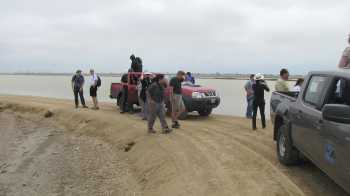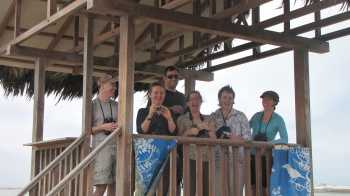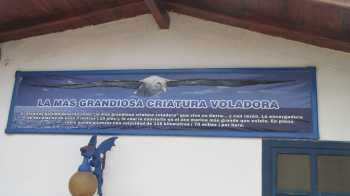Most of the delegates attending the Sixth Meeting of ACAP's Advisory Committee meeting in Guayaquil, Ecuador took a day off for a field outing yesterday. Boarding a bus we travelled west to Salinas where we visited the Ecuasal (Ecuatoriana de Sal y Productos Quimico) salt works to view migratory shorebirds and seabirds, which included pelicans, cormorants, gulls and terns. Flamingos, grebes and ducks were also present. The Lagunas de Ecuasal-Salinas are an Important Bird Area as the evaporation pans and linking channels (spread over 500 ha) support up to 30 000 over-wintering Wilson's Phalaropes Phalaropus tricolor.

Delegates viewing birds at the Ecuasal salt pans

Spencer Clubb, Rosemary Gales, Luke Finley, Kim Rivera, Estelle van der Merwe and Rebecca Bird enjoy the shade at Ecuasal
We then entered a military area to look at the South American Sea Lions Otaria flavescens at La Lobería, a rocky headland near the site of past international surfing competitions. Salinas got its start as a small fishing village and is now one of the most travelled tourist spots on the coast of Ecuador, where surfing is very popular.
From there it was back on the bus for a latish lunch at a coastal cliff-top restaurant in Ballenita. No "little whales" were seen but pelicans, frigate birds and a sole booby flew past us as we ate a welcome meal.

The only albatross spotted: at our lunch-time stop
Photographs by John Cooper
No ACAP-listed albatrosses and petrels were seen on the outing but delegates returned, hopefully refreshed, for today's final day of the committee meeting and the adoption of its report. News of that due to be posted over the coming weekend.
With thanks to the meeting's Ecuadorian hosts for arranging an enjoyable outing.
John Cooper, ACAP Information Officer, 2 September 2011

 Français
Français  English
English  Español
Español